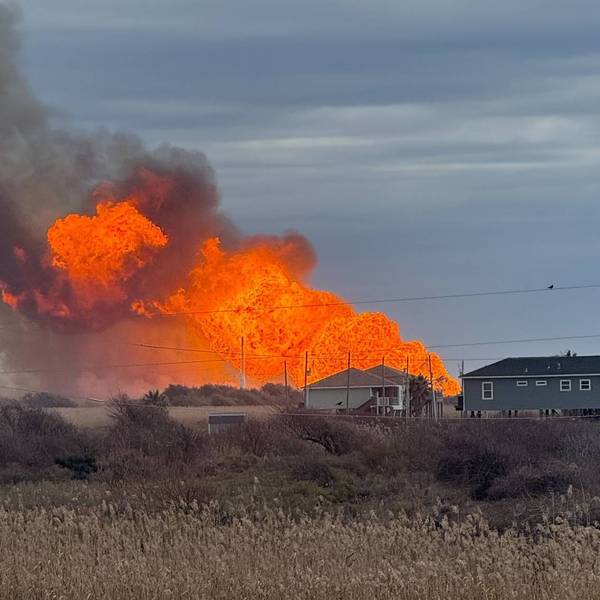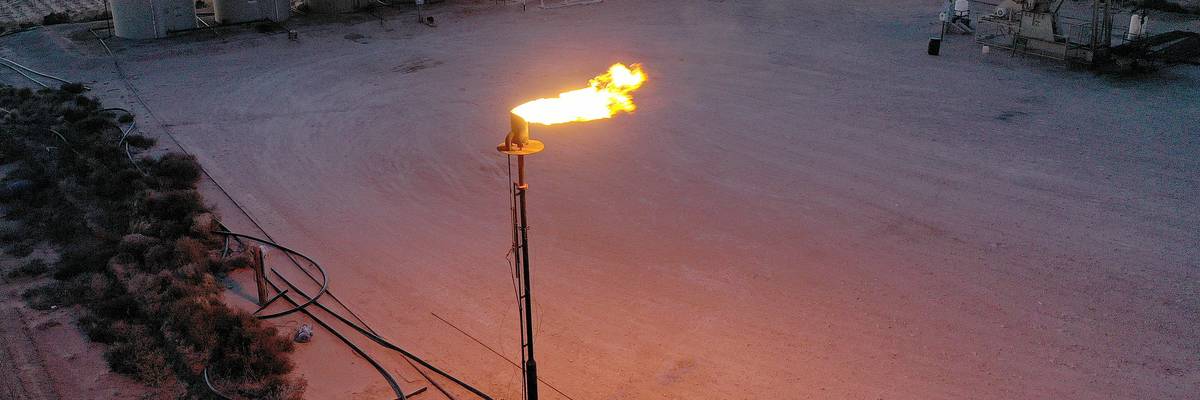The fossil fuel industry has long argued that fracked gas can serve as a "bridge" to a renewable-powered future, but a new study confirms that uncontrolled leaks make it as dangerous for the climate as coal.
So-called natural gas is derived from hydraulic fracturing (fracking) and composed mostly of methane—a planet-heating gas 80 times more potent than carbon dioxide over its first 20 years in the atmosphere. A methane leakage rate of as little as 0.2% is enough to render gas equivalent to coal in driving global warming, according to a peer-reviewed manuscript accepted last week in Environmental Research Letters.
The paper is set is be published next week. According to its abstract:
Global gas systems that leak over 4.7% of their methane (when considering a 20-year timeframe) or 7.6% (when considering a 100-year timeframe) are on par with lifecycle coal emissions from methane-leaking coal mines.
The net climate impact from coal is also influenced by SO2 [sulfur dioxide] emissions, which react to form sulfate aerosols that mask warming. We run scenarios that combine varying methane leakage rates from coal and gas with low to high SO2 emissions based on coal sulfur content, flue gas scrubber efficiency, and sulfate aerosol global warming potentials.
The methane and SO2 co-emitted with CO2 alter the emissions parity between gas and coal. We estimate that a gas system leakage rate as low as 0.2% is on par with coal, assuming 1.5% sulfur coal that is scrubbed at a 90% efficiency with no coal mine methane when considering climate effects over a 20-year timeframe.
Recent aerial measurement surveys of oil and gas production in the United States show methane leakage rates ranging from "0.65% to 66.2%, with similar leakage rates detected worldwide," the abstract states. "These numerous super-emitting gas systems being detected globally underscore the need to accelerate methane emissions detection, accounting, and management practices."
Lead author Deborah Gordon, an environmental policy expert at Brown University and the Rocky Mountain Institute, told The New York Times on Thursday that if fossil gas leaks, even a little, "it's as bad as coal."
"It can't be considered a good bridge, or substitute," Gordon emphasized.
"What the world requires is to move away from all fossil fuels as soon as possible, to a 100% renewable energy future."
As the Times noted, the study "adds to a substantial body of research that has poked holes in the idea that natural gas is a suitable transitional fuel to a future powered entirely by renewables, like solar and wind."
Despite mounting evidence that expanding fossil fuel extraction and combustion is incompatible with averting the worst consequences of the climate emergency, the Inflation Reduction Act passed last year by congressional Democrats "includes credits that would apply to some forms of natural gas," the Times reported.
"When power companies generate electricity by burning natural gas instead of coal, they emit only about half the amount of planet-warming carbon dioxide," the newspaper observed. "In the United States, the shift from coal to gas, driven by a boom in oil and gas fracking, has helped reduce carbon emissions from power plants by nearly 40% since 2005."
But that ignores the dangers posed by methane, the primary component of fossil gas. Emissions and atmospheric concentrations of methane continued to climb in 2022, thanks in large part to massive leaks from fossil fuel infrastructure. A study published in October found that pipelines transporting fracked gas in the Permian Basin oil field of the U.S. Southwest are leaking at least 14 times more methane than previously thought.
Another recent study found that more than 1,000 "super-emitter" incidents—human-caused methane leaks of at least one tonne per hour—were detected worldwide last year, mostly at oil and gas facilities, including in Louisiana and Pennsylvania. In addition, it identified 112 global "methane bombs," which are defined as fossil fuel extraction sites where gas leaks alone from future production would release what amounts to 30 years of U.S. greenhouse gas pollution.
Methane is responsible for an estimated 30% of global temperature rise today, and scientists have made clear that policymakers must prioritize cutting this short-lived heat-trapping gas to avoid climate chaos. Even a temporary breach of the 1.5°C threshold—something experts warn has a 50% chance of happening by 2026—could trigger irreversible harm from multiple tipping points.
Robert Howarth, an earth systems scientist at Cornell University who sounded the alarm about methane leaks more than a decade ago, praised the forthcoming study.
"Their conclusion is to once again point out that natural gas may not be any better at all for the climate than is coal, particularly when viewed through the lens of warming over the next 20 years or so, which of course is a critical time" for meeting climate targets, he told the Times.
"I do hope the policy world and the political leaders of the world pay attention to this, as I fear too many remain too fixated at simply reducing coal use, even if it results in more gas consumption," Howarth added. "What the world requires is to move away from all fossil fuels as soon as possible, to a 100% renewable energy future."




